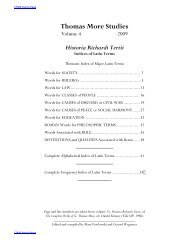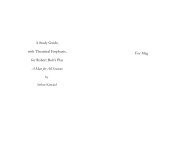life of john picus earl of mirandola - The Center for Thomas More ...
life of john picus earl of mirandola - The Center for Thomas More ...
life of john picus earl of mirandola - The Center for Thomas More ...
You also want an ePaper? Increase the reach of your titles
YUMPU automatically turns print PDFs into web optimized ePapers that Google loves.
Honour<br />
Riches<br />
[94]<br />
42 <strong>Thomas</strong> <strong>More</strong>’s Life <strong>of</strong> John Picus<br />
honours which there<strong>for</strong>e lift us up that they might throw us down;<br />
how deadly these riches which the more they feed us the more they<br />
poison us; how short, how uncertain, how shadow-like, false, imaginary<br />
it is that all these things together may bring us, an though they flow<br />
to us as we would wish them. Remember again how great things be<br />
promised and prepared <strong>for</strong> them which, despising these present things,<br />
desire and long <strong>for</strong> that country whose king is the Godhead, whose<br />
law is charity, whose measure is eternity. Occupy thy mind with these<br />
meditations and such other that may waken thee when thou sleepest,<br />
kindle thee when thou waxest cold, confirm thee when thou waverest,<br />
and exhibit the wings <strong>of</strong> the love <strong>of</strong> God while thou labourest<br />
to heavenward, that when thou comest home to us (which with great<br />
desire we look <strong>for</strong>) we may see not only him that we covet but also<br />
such a manner one 1 as we covet. Farewell, and love God, Whom <strong>of</strong><br />
old thou hast begun to fear.¦ At Ferrara, the second day <strong>of</strong> July, ⌐ the<br />
year <strong>of</strong> our Redemption, ¬ 1492.<br />
⌐ <strong>The</strong> Interpretation <strong>of</strong> John Picus upon this Psalm, “Conserva Me Domine.”–<br />
Conserva me Domine quoniam speravi in te. Dixi Domino: Deus meus es Tu,<br />
quoniam bonorum meorum non eges. Sanctis qui sunt in terra ejus mirificavit<br />
voluntates suas. Multiplicatae sunt infirmitates eorum postea acceleraverunt. Non<br />
congregabo conventicula eorum de sanguinibus: nec memor ero nominum eorum<br />
per labia mea. Dominus pars hereditatis meae et calicis mei: tu es qui restitues<br />
hereditatem meam mihi. Funes ceciderunt mihi in praeclaris: etenim hereditas mea<br />
praeclara est mihi. Benedicam Dominum qui tribuit mihi intellectum: insuper et<br />
usque ad noctem increpuerunt me renes mei. Providebam Dominum in conspectu<br />
meo semper, quoniam a dextris est mihi ne commovear. Propter hoc laetatum est cor<br />
meum et exultavit lingua mea, insuper et caro mea requiescet in spe. Quoniam non<br />
derelinques animam meam in inferno: nec dabis sanctum tuum videre corruptionem.<br />
Notas mihi fecisti vias vitae : adimplebis me laetitia cum vultu tuo. Delectationes<br />
in dextera tua usque in finem. ¬2<br />
¦15 <strong>More</strong> omits Bigus te salutat, “Bigo sends you greetings” (CW 1:362, 363).<br />
1. him…one: In these two cases where <strong>More</strong> has the third person, the Latin original has the<br />
second (CW 1:362).<br />
2. “This commentary on Psalm 15 (as it is in the Vulgate) is the only part <strong>of</strong> Picus’ commentary<br />
on the Psalms to be printed in his Opera omnia…. <strong>More</strong>’s translation is also the first printing in<br />
English <strong>of</strong> a psalm commentary. Indeed, such commentaries in Middle English are relatively<br />
rare…” (CW 1:239).<br />
5<br />
10<br />
15<br />
20<br />
25<br />
30











